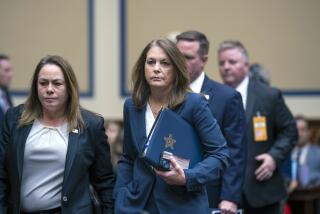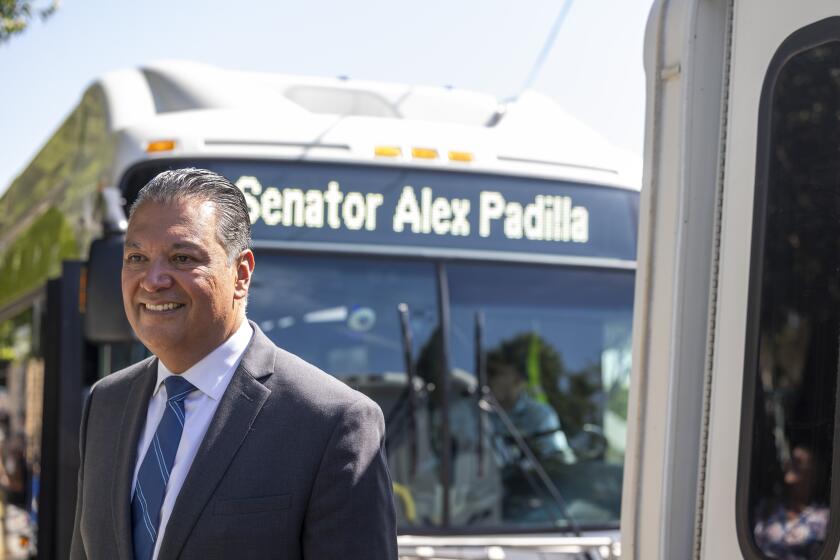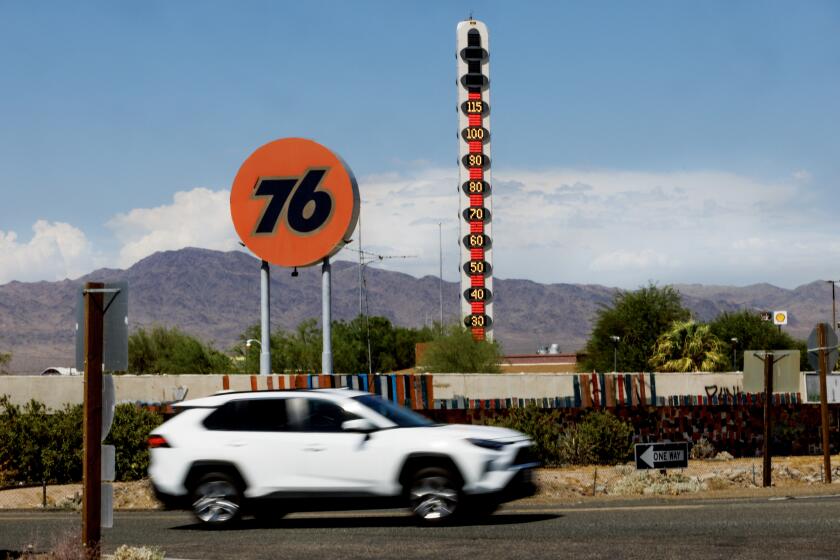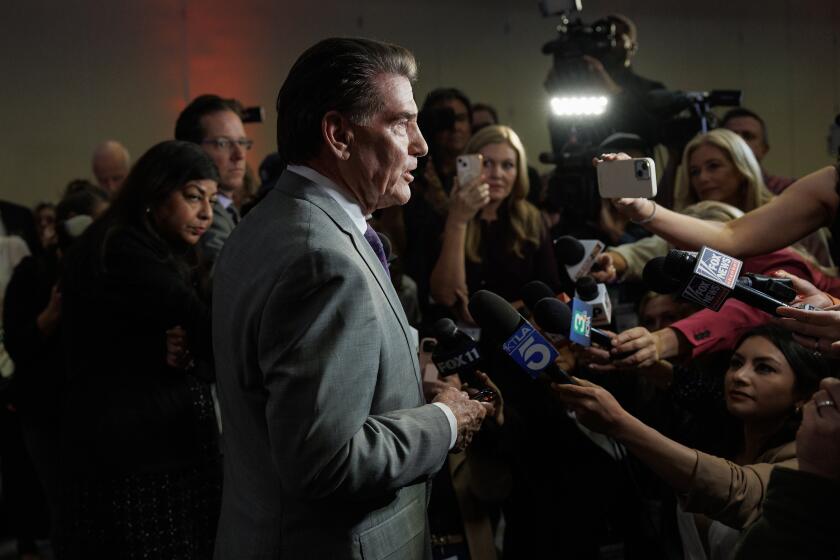Ballot Measure in Works to Spread Slots Beyond Casinos
In a move that could break Indian tribes’ monopoly on Nevada-style gambling in California, corporations that own major horse-racing tracks and card rooms are preparing an initiative aimed at next November’s ballot to allow them to operate slot machines.
Some backers of the initiative have connections to Gov. Arnold Schwarzenegger, who has offered no position on the proposal.
The possibility that such a measure would make it to the ballot could add to pressure on tribes to comply with Schwarzenegger’s view that they should increase payments to the state. The governor has said he does not oppose increased gambling as long as casino owners pay their “fair share.”
If the measure went before voters and they approved it, it could open the way for as many as 30,000 slot machines to be split among five privately owned racetracks and 11 card rooms. California Indians operate 54 casinos with 54,000 slot machines, and can expand under current compacts with the state to 61,000 machines.
If backers of the initiative succeeded, slot machines would be readily accessible in urban areas, where most of California’s population lives. Indian casinos generally are in less-developed regions.
“The racing industry feels that its survival is dependent on this,” said Bob Lewis, a major figure in horse racing and the owner of Kentucky Derby winners Silver Charm in 1997 and Charismatic in 1999.
Lewis, of Newport Beach, said Thursday that the proposed initiative would be filed as early as today with the California attorney general’s office. Other sources said it may not be filed until early next week.
The measure would be a constitutional amendment, requiring as many as 1 million signatures to qualify for the ballot.
The proposition would probably receive financial backing from corporations that could benefit from it, including those that own the Hollywood Park, Los Alamitos and Santa Anita racetracks, along with two racetracks in the Bay Area and several card rooms, including the California Commerce Club near Los Angeles.
Beverly Hills attorney Roger H. Licht, chairman of the California Horse Racing Board, said Thursday that Frederick M. Baedeker Jr., president of the Hollywood Park racetrack, requested a meeting set for today to brief him on the initiative. Baedeker could not be reached for comment.
Several other sources said the proposition was being aimed at the ballot in November 2004.
Such a campaign is likely to cost tens of millions of dollars. Tribes, the most free-spending of all California political players, already are contemplating ways to kill the measure.
“Tribes will vigorously oppose it with all the resources at their disposal,” said Sacramento attorney Howard Dickstein, who represents several tribes with major casinos.
Dickstein’s clients are among those that have struck deals with local governments. He has said his clients would be willing to make payments to the state. But he said the initiative, as outlined by a variety of sources, was an attempt by commercial gambling interests to “extort money from tribes.”
“This is an end-run around the legal framework that has been in place for centuries,” Dickstein said.
The California Constitution grants Native Americans the exclusive privilege to operate Nevada-style gambling on their reservations. The initiative would not directly open the way for slot machines at the major card rooms and racetracks.
Rather, it would give tribes and Schwarzenegger 90 days to renegotiate key details of the compacts negotiated by former Gov. Gray Davis and tribes in 1999 -- and would dictate key terms.
Tribes would be expected to pay 25% of their net revenue to the state -- perhaps as much as $1.25 billion of the roughly $5 billion that they are believed to take in from their casinos. That represents about 10% of the state’s expected budget shortfall in this fiscal year and next.
All tribes with gambling compacts would have to agree to the terms, and evidently would retain their monopoly on slot machines if they did so. If the tribes failed to agree, tracks and card rooms would receive as many as 30,000 slot machines and would pay 35% of their net winnings to cities and counties. The bulk of the money would be earmarked for police, firefighters and public schools. That would amount to about $1 billion a year.
Like Schwarzenegger, Davis called on tribes to make payments to the state from casino revenues. Most tribes refused, citing their status as sovereign entities. By law, states cannot force Native Americans to pay taxes on money earned in tribal enterprises.
Along with requiring that tribes make payments, the initiative would force them into land-use agreements with local governments affected by casinos. Additionally, tribes would have to comply with the California Environmental Quality Act, Political Reform Act and Gambling Control Act. At present, tribes generally are not subject to state laws and regulations, and need not obey such laws.
Tribes have been the most well-heeled political players in California during the last five years, having spent more than $130 million on two ballot measures and various other state campaigns since 1998, including the recent recall, in which they opposed Schwarzenegger’s candidacy. By contrast, four of the main companies contemplating financing the initiative have spent more than $1.16 million on California campaigns since January 2002.
Schwarzenegger’s aides say the governor is not involved in the gambling initiative. But several players are Schwarzenegger associates.
The governor is a friend of fellow Austrian native Frank Stronach, chairman of Magna International, a Canadian firm and parent of the company that owns Santa Anita Park, as well as the Golden Gate Fields and Bay Meadows racetracks in the Bay Area. Magna also has ownership interests in an Internet wagering venture and in a cable television outlet that airs racing 24 hours a day.
A lobby firm, the Flanigan Law Firm, that is close to one of Schwarzenegger’s political mentors, former Gov. Pete Wilson, represents Pinnacle Entertainment, which owns the Crystal Park card room in Los Angeles and Hollywood Park card room.
Bonnie Reiss, a senior advisor to Schwarzenegger and a long-time friend of the governor and his wife, Maria Shriver, is a former Pinnacle board member.
Californians approved ballot measures authorizing gambling on tribal land in 1998 and 2000. During the recall contest, the Schwarzenegger campaign aired television spots showing a slot machine with the candidate detailing the amounts that tribes had spent on campaigns and how they pay no taxes on their casino winnings.
More to Read
Sign up for Essential California
The most important California stories and recommendations in your inbox every morning.
You may occasionally receive promotional content from the Los Angeles Times.







